Contents
See Household Custom Fields from Tamarac Reporting in Tamarac CRM
Custom fields in Tamarac Reporting allow you to capture information specific to your organization that the system does not include by default. For example, if your organization assigns internal account codes to distinguish management styles, you can create a custom field to track and report on these account codes in Tamarac Reporting. By using the same client or account information in Tamarac CRM, you can better synchronize records across both systems, ensuring seamless tracking of custom data between Reporting and CRM.
With this release, you can map Household custom fields from Tamarac Reporting to Tamarac CRM, linking and showing more data between both systems.
Mapped fields sync automatically, and any changes you make in one system will appear in the other system.
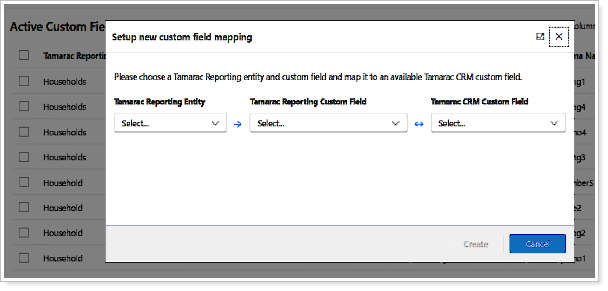
To see Tamarac Reporting custom fields in Tamarac CRM, a CRM administrator must map the custom fields. If necessary, they can also deactivate or delete fields that no longer apply.
For more information, see Custom Field Integration.
Streamline Data Review with Audit Dashboards
Whether you're a financial advisor or part of their critical support team, staying on top of client data is an essential part of your daily practice. Dashboards and views in Tamarac CRM offer valuable reporting solutions to accompany these review processes.
As your practice’s needs grow and evolve, so does the demand for readily available, comprehensive data lists that don’t require additional customization.
To meet this demand, we’ve introduced new Audit Dashboards that consolidate critical audit views, making it easier to manage day-to-day operations and drive informed decisions.
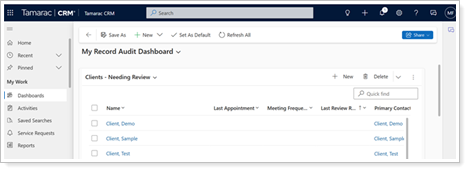
With this release, we introduce the following System Dashboards:
-
My Record Audit Dashboard. The dashboard and associated view access is available for all users by default. You do not need any additional security roles to see this dashboard.
-
Firm Record Audit Dashboard. The dashboard and associated view access is strictly for users that need access at a firm-wide level. To see this dashboard, you must have the new security role Tamarac Firm Record Audit Dashboard. For more information about security roles, see Create Users in Dynamics 365.
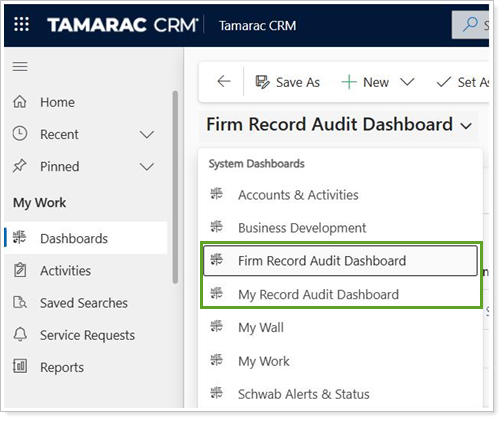
These dashboards include both new and currently available views that will allow you to audit:
-
Activities, with system views such as My Overdue Activities and Activities Delegated.
-
Accounts, with system views such as Clients I Work With – Needing Review and Clients I Work With – Service Team Members.
-
Contacts, with system views such as Contacts I Work With – Data Audit and Contacts I Work With – Contact Preferences.
-
Leads, with system views such as Leads I Work With – Key Dates and Leads I Work With – Needing Contact.
-
Financial Accounts, with system views such as Financial Accounts I Work With – Contact Audit, and Financial Accounts I Work With – Older Than 1 Year Under 100 Value.
For more about the audit dashboard and system views, see Audit Dashboards.
Transform CRM Data into Excel Tables and Actionable Reports
As an advisor, efficiently tracking and organizing client data is essential for operational success. However, building a truly successful practice often involves taking it a step further—leveraging that data for analysis to strengthen and optimize client relationships.
Until now, analyzing data on the Tamarac CRM platform has come with limitations and challenges. With this release, we remove some of those challenges. You can now extract, analyze, and present your Dynamics 365 data in Microsoft Excel using customizable Excel templates.

Excel templates can help support a variety of strategic business tasks, including but not limited to:
-
Sales forecasting
-
Pipeline management
-
Leads scoring
-
Territory planning
-
And more.
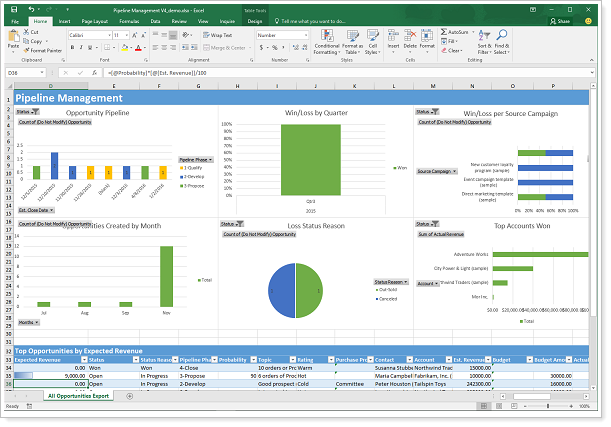
To create Excel Templates in CRM, you must be a System Administrator who has access to the Advanced Settings page. In the Settings menu, under Templates, you will see Document Templates.
To review the steps to create an Excel template in Tamarac CRM, see Excel Templates.
To learn how to create and optimize Excel Templates, see Create and deploy Excel templates - Dynamics 365 Customer Insights (external link opens in a new tab).
Schwab Integration Enhancements
Audit Schwab Digital Account Opening Data
The Digital Account Opening (DAO) integration between Tamarac CRM and Schwab simplifies your account opening process by allowing you to seamlessly transfer contact information from Tamarac CRM to Schwab. However, users have faced challenges with understanding and auditing the data that is mapped over in the process.
To address these concerns, we’re introducing a powerful new Audit – Custodian DAO Data system view designed to provide an actionable list to complement your digital account onboarding workflow. This view is available under Contacts and allows you to review and optimize your clients' data before initiating the account opening process — minimizing disruptions and ensuring you’re fully prepared.

Schwab Digital Account Opening integration users
In a future release, we will include the citizenship and residency fields in the information sent to Schwab during the digital account opening process.
To learn more about digital account opening with Schwab, see Schwab Digital Account Opening (DAO) Integration.
See New Schwab RMD Tax Withholding Percentage Fields
If you use the Schwab RMD integration, you know how useful it is to see Schwab RMD information directly in Tamarac CRM. Based on your feedback, we’re adding the following two Financial Account fields in Tamarac CRM to align better with Schwab:
-
Tax Withholding Election Federal (%)
-
Tax Withholding Election State (%)

The new % fields replace the existing Tax Withholding Election Federal ($) and Tax Withholding Election State ($) fields. The old fields will be removed in the next release. If you have custom forms that use the old $ fields, update them to use the new % fields.
For more information about the Schwab RMD integration, see Schwab Required Minimum Distributions (RMD) Integration.
Submit Multiple Schwab Service Requests in One Flow
In our last release, we introduced the ability to submit Schwab service requests directly from Tamarac CRM, streamlining the process of securely sending forms and applications to Schwab.
In many client workflows, a single service request is just the beginning. Recognizing this, we’ve made it even easier to keep the process moving. Once you submit a service request, you can now immediately start another one right from the confirmation screen with the new Submit another button. This enhancement eliminates extra steps, making it even more seamless to provide your clients with the service they deserve.
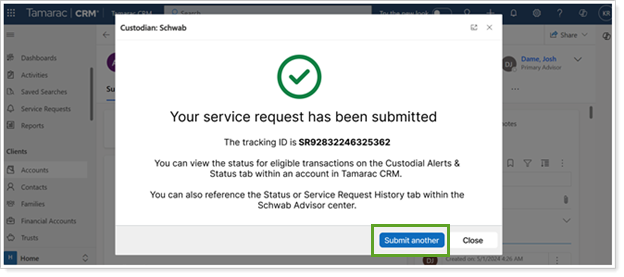
For more information about the service request integration, see Create a Schwab Service Request in Tamarac CRM.
Filter by Custodian on the RMD Planning Report
Tracking clients’ RMD distributions is an essential part of your role, and the RMD Planning Report is an important tool in your toolbox for helping manage those distributions. Now, to give you finer granularity and specificity in the report, you can filter by custodian. The report now also includes the Custodian column for clear tracking. This filter dynamically updates to show any custodians that clients have assigned to a Financial Account.
Advisors who use the Schwab RMD integration can select Schwab to see the Schwab-specific data in the RMD Planning Report.
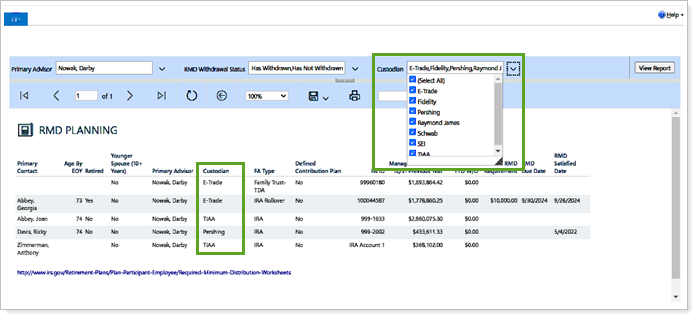
Note
You can use this to audit custodian assignment. If you see duplicate or erroneous entries, you should review the custodians assigned and ensure data accuracy.
For more information about the Schwab RMD integration, see Schwab Required Minimum Distributions (RMD) Integration.
For more information about the RMD Planning Report, see RMD Planning Report.
Capture Citizenship Details in Contact Records
As a part of this release, we’ve added critical citizenship fields to the Contact entity record. These fields are included in the new Schwab DAO audit view and can be mapped to Schwab seamlessly with the rest of the required data:
- Is US Citizen
- Is US Resident
- Is Citizen of Another Country
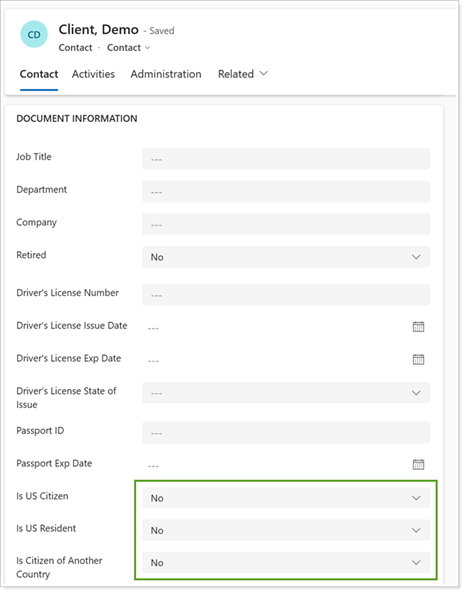
For each contact, you’ll find these new fields in the Contact record, in the Summary tab, under Document Information.
You can use these fields to organize your client data.
Schwab Digital Account Opening integration users
In a future release, we will include the citizenship and residency fields in the information sent to Schwab during the digital account opening process.
For more information about client record fields that you configure for a new record, see Creating a New Contact and Account.
